How The Islamic Economy Can Contribute To Humanitarian AID
This chapter briefly examines the status of humanitarian assistance in the context of the global economy and how effective, focused, and accountable that assistance has been. It highlights the urgent need for humanitarian aid to be given in the form of finance, and the potential contribution that can be made to this aid by the Islamic banking and finance sector. It examines the synergies between Islamic values and the shared values underpinning the Sustainable Development Goals (SDGs) as adopted worldwide by 193 countries in 2015.
It is globally acknowledged that aid, if it is to make a real impact on reducing poverty and suffering; needs to be targeted, relevant, and compatible with local cultures and religious traditions. The realization is growing that the principles inherent in Islamic countries have a great contribution to make to this discussion, particularly in terms of the financial assistance sent to areas where Muslims form a majority of the population. It is within this context that this chapter focuses on the need for partnerships and cooperation between both international organizations and non-profit organizations, enabling financial aid to have maximum impact.
A World In Need
Right now, there are 135.7 million people on this planet in desperate need of humanitarian assistance. This may seem like an insurmountable challenge. However, when considering that the global economy is valued at US$78 trillion, it is almost unthinkable that a way cannot be found to share resources to help those in need. Clearly, the problem is not one of available resources. At the core is a management problem.
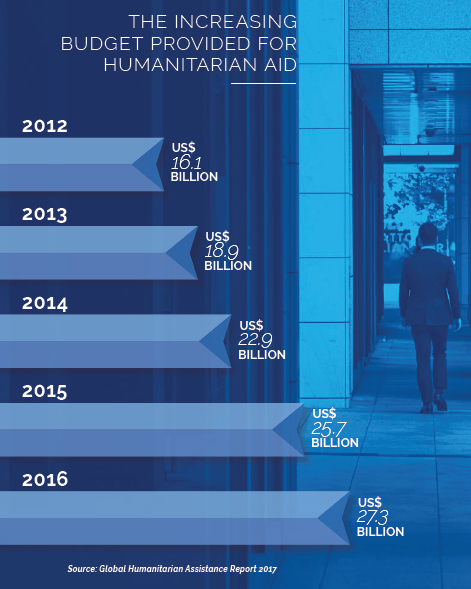
Upheavals caused by natural disasters, war, and conflict are global realities that have displaced millions of people on nearly every continent, which subsequently brought with them their own unique set of challenges. This is further accompanied by the economic, environmental, political, and security ramifications that occur with such displacement. Displacement creates increased demands for food, water, sanitation, education, and healthcare; which in turn increase pressure on communities and carry significant costs to governments and businesses.
Recent examples of such emergencies are all too familiar. The Rohingya crisis in Myanmar has put immense pressure on Bangladesh and surrounding countries, while the Syrian conflict has created turmoil in states such as Iraq, Jordan, Lebanon, and Turkey; with millions of refugees needing a level of support that threatens to overwhelm these countries. All told, Ethiopia, Iran (Islamic Republic of), Jordan, Lebanon, and Pakistan are home to the majority of the world’s refugees.
Still, in the midst of these heart-breaking crises, evidence emerges that the best of humanity is at work. There are hundreds of thousands of humanitarian aid workers who selflessly dedicate their time and energy—and sometimes even their lives—to helping the most vulnerable on the planet. But, these workers cannot solve such grave crises on their own or without adequate resources. Currently, the world is falling short in providing sufficient funds and support to these individuals, thus limiting the wider efforts of humanitarian organizations to meet those needs. Although donors have stepped forward to commit additional funds to meet the growing humanitarian requirements, more needs to be done.
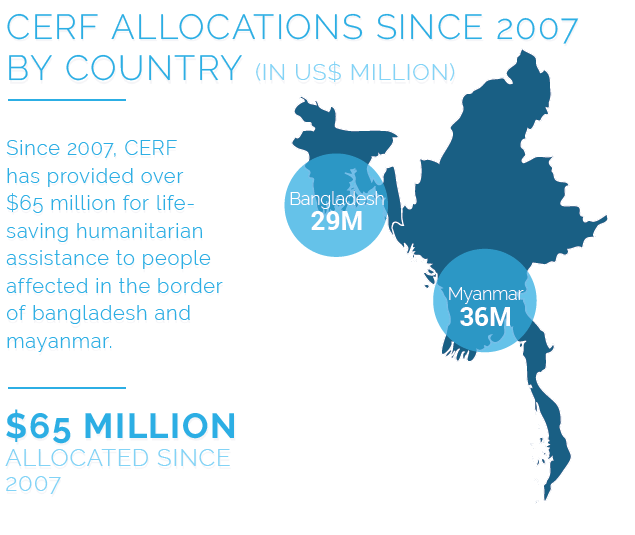
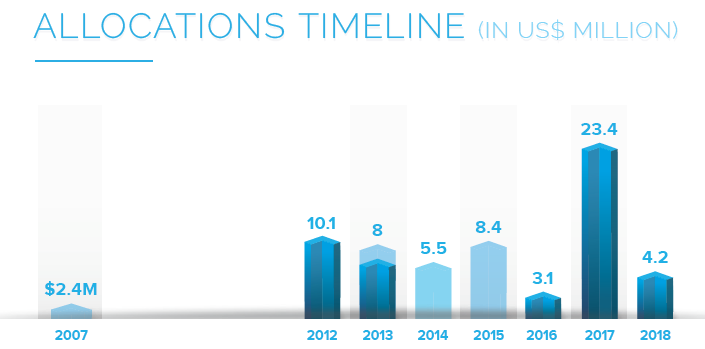
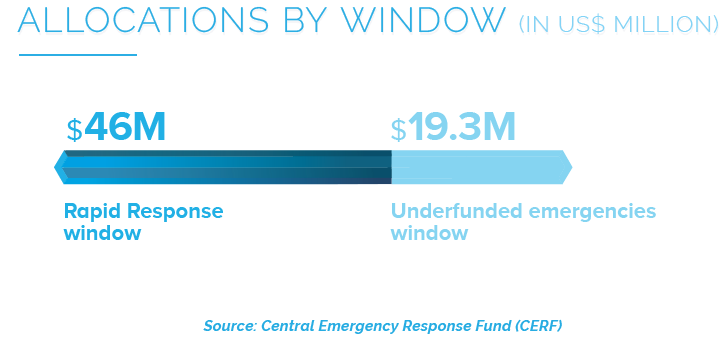
As per 18 January 2018, a total of US$2.4 billion, or 46% of all funds allocated by the Central Emergency Response Fund (CERF) have been allocated to 33 Muslim-majority countries. This includes the Rohingya crisis in Myanmar, which is currently the world’s fastest-growing refugee crisis.
If we are to collectively honor the noble principle of the humanitarian imperative—that receiving life-saving humanitarian aid is a right and providing it is a duty—then there is much more that will need to be done. However, what is important is not just the level of aid itself, but that it is delivered in a strategic way that maximizes its impact and acknowledges the realities “on the ground”. Any aid must involve local people, local groups, and local ways of working. That calls not only for heightened levels of transparency and accountability but for a targeted approach as to how that aid is delivered. As humanitarian funding requirements are at an all-time high of US$22.5 billion, the need for support could not be more evident. It is time for people across all faiths and denominations to come together to form partnerships that will address the significant problems prevailing at this point in time.
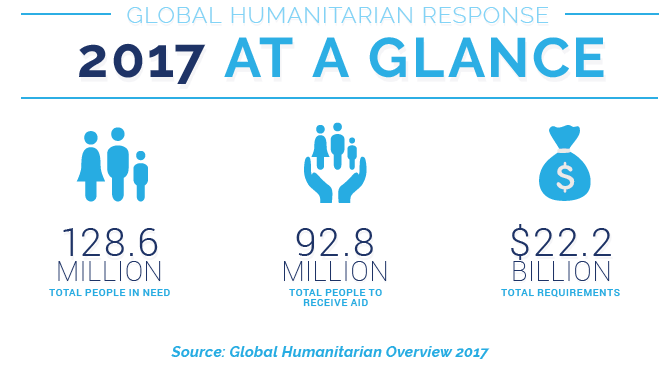
How The World’s Needs Are Met
Many organizations do outstanding work in addressing these enormous human needs. Key among them is the United Nations Office for the Coordination of Humanitarian Affairs (OCHA). From earthquakes, storms, and droughts to displacement and disruption of basic services, supporting and coordinating responses to natural disasters and conflicts remains central to OCHA’s work. OCHA works with humanitarian partners around the world to identify the most critical humanitarian needs, to strategize appropriate responses, and to determine the levels of funding support that are needed to ensure that plans are successfully implemented. At the country level, OCHA helps partners to build common strategies and implementation plans and to appeal for funds as a group.
OCHA also manages two pooled funding mechanisms: the Central Emergency Response Fund (CERF), which is global in its coverage and Country-based Pooled Funds (CBPF). Both funds are designed to meet specific humanitarian funding needs and, if used jointly and strategically, they can collectively form a powerful funding toolbox for the humanitarian community. By leveraging their comparative advantages—CERF’s disbursement speed and CBPF’s ability to directly fund local NPOs—the strategic use of these funds has helped partners deliver a stronger collective response, ensuring maximum impact of limited resources. For example, in early 2017, when Somalia was at risk of famine, combined allocations from both funds (roughly US$32 million) were made available in a manner that was prompt enough to boost early responses by February 2017.
Over the years, crises have grown more severe, protracted, and complex as can be seen in the “mega crises” in the Democratic Republic of the Congo, Iraq, Syria, and Yemen, as well as during the catastrophic storms and widespread floods that impacted hundreds of communities. In addition, there are also existing protracted and neglected emergencies in such places as Afghanistan, the Horn of Africa, and the Lake Chad Basin. Every emergency is unique, but all have two things in common: great human suffering and a need for resources to alleviate that suffering. CERF, as an essential enabler of humanitarian action, allows country teams to kick-start relief efforts immediately in a coordinated and prioritized response through a vast network of partners. It helps scale up and sustain protracted relief operations to avoid critical gaps when no other funding is available.
Recognizing the added value brought by the existence of the global humanitarian system and by such mechanisms as CERF, donors have been generously giving contributions in response to the world’s worst crises. For example, four major humanitarian pledging conferences were held in 2017. These events attracted additional funding announcements and, in several cases, brought policy commitments for crises in Nigeria and Syria (and in neighbouring countries), and for the Rohingya refugee crisis. In total, these conferences raised more than US$7.8 billion for use in 2017, as well as almost US$4 billion for 2018 and beyond. Despite this great success and renewed confidence in the global humanitarian system, new and additional support from a diverse range of Member States and regional and private entities is needed to provide urgent “first aid” to people trapped in the midst of the worst natural catastrophes and human atrocities of our lifetime. A strong humanitarian system able to deliver on its mandate is everyone’s responsibility, and steps towards the global commitment to leave no one behind and to ensure that those who have been left the furthest behind are reached first must be taken.
“AS CRISES MULTIPLY THROUGHOUT THE WORLD, WE MUST EMPOWER CERF TO ASSIST US INDIVIDUALLY AT THE COUNTRY LEVEL OR COLLECTIVELY AT THE REGIONAL LEVEL IN ADDRESSING THE VITAL NEEDS OF POPULATIONS AS BEST AS POSSIBLE.”
MAHAMADOU ISSOUFOU PRESIDENT OF NIGER
Maximizing The Impact Of Humanitarian Aid
When a crisis strikes, every second counts. It is critical that accurate information be available; in addition, any miscommunication between partners can have the potential to lead to the loss of countless lives. Thus, the importance of well-coordinated and integrated emergency response, as supported by OCHA, cannot be overstated. There is no doubt that the prospect of bringing about meaningful and long-lasting change to the way financial humanitarian aid is sourced from the global community can be daunting. In the face of regular, ongoing shocks, how can changes be made to the way these issues are currently financed and addressed?
While nothing should undermine the commitment to principled humanitarian action, there is, at the same time, a shared moral imperative of preventing crises and of sustainably reducing people’s levels of humanitarian need, a task that requires the pursuit of collective outcomes. It is this notion of “collective outcomes” that has been placed at the center of the commitment to the New Way of Working, summarized in the Commitment to Action signed by the Secretary-General and eight United Nations Principals at the first-ever World Humanitarian Summit (WHS) in Istanbul, Turkey, in 2016; and endorsed by the World Bank and the International Organization for Migration.
Transcending the humanitarian-development divide by working to achieve collective out- comes was also widely supported by donors, NPOs, crisis-affected States, and others. The New Way of Working frames the work of development and humanitarian actors, along with national and local counterparts, in support of collective outcomes that reduce risk and vulnerability. Ending needs by reducing risks and vulnerability is a shared vision, one that transcends this decades-old divide. The results will not only improve the lives of the most vulnerable, but the reductions in risk and vulnerability are essential to ensuring that development progress is accessible to all communities, including those affected by crises.
The aim of strong national and local ownership of collective outcomes is an integral part of the New Way of Working. This shift to “reinforce and do not replace” the roles of national and local actors in the prevention and delivery of assistance was also among the most prominent outcomes of the WHS, and is central to the changes in mindset and behaviour required to sustainably reduce need, risk, and vulnerability. OCHA and the pooled funds have been at the forefront of supporting local ownership. In 2017, approximately 25% of CERF’s and CBPF’s allocations went to national and local NPOs, thereby ensuring that the implementation of crucial humanitarian activities was carried out by local partners on the ground. There are also many voices across the humanitarian aid sector that are calling for more accountability in terms of how resources are raised, channelled, and spent. CERF and CBPF are at the forefront of promoting transparency in aid delivery. Both funds publish funding decisions and data in real-time on OCHA’s website, on OCHA’s Financial Tracking Service (FTS), and through the IATI Standard.
The goal must be to strike a balance between a broader approach to humanitarian aid while ensuring that the resources are still found to meet the immediate needs of those most likely to be left behind, that is, those affected by conflict and disasters. The SDGs aim to end extreme poverty, thus ensuring that all people have access to basic public goods and services by 2030. Success or failure to achieve the SDGs will depend upon whether or not the fragility and risks are managed efficiently and effectively. It goes without saying that development is the best resilience-builder of all.
Alignment With The Values Of Islamic Finance
In a world where there is more private wealth than ever before, the role of the private sector in contributing and effectively coordinating humanitarian aid continues to be underutilized. It is generally recognized that the humanitarian ecosystem is now in a position to harness the power, skills, and capabilities of business. In short, the world of business has the opportunity now to participate in partnerships and to maximize assistance efforts. One salient point that should be considered is that, when a global perspective on humanitarian crises is taken, presently 90% of crises occur in the Member States of the Organization of Islamic Cooperation (OIC). Therefore, Islamic social finance has an obvious opportunity in relation to global humanitarian aid financing. There is a very real potential that Islamic finance could provide solutions to the global humanitarian financing problem, and with 72% of Muslims currently “unbanked”, the business potential for the Islamic finance sector is massive. But, with many of today’s conflicts occurring in Muslim-majority countries, markets clearly need to stabilize for that to happen. Strategic emergency relief is a vital solution.
“HELPING AND SHARING ARE, OF COURSE, AT THE VERY HEART OF THE ISLAMIC FAITH. AS THE PROPHET MUHAMMAD (BLESSINGS AND PEACE BE UPON HIM) SAID: “HE DID NOT BELIEVE, HE DID NOT BELIEVE, THE PROPHET SAID. HE DID NOT BELIEVE, HE WHO SLEPT WITH A FULL STOMACH KNOWING THAT HIS NEIGHBOUR IS HUNGRY.”
(AL-HAKIM)
The business world is committed to finding a way to alter the behaviours of companies so that they take into consideration the kind of values and principles that Islam embodies. In light of these developments, new development goals for the next decade have been drafted, setting guidelines in order to bring peace, health, and equality to all corners of the earth. Countries, after having plundered and destroyed much of the earth and its atmosphere, have undertaken steps to becoming better stewards of the planet. The next generation feels compelled to make a difference, and their optimism generates hope.
Box.1
ABOUT THE Islamic Reporting INITIATIVE
THE ISLAMIC REPORTING INITIATIVE (IRI)
is an independent non-profit organization leading the creation of the world’s first reporting standard for corporate sustainability and social responsibility, across all business sectors, based on Islamic values and principles.
By making sustainability and CSR culturally relevant, the IRI aspires to effectively accelerate the uptake of sustainability and CSR and systemically advance the implementation of the SDGs through nearly a quarter of the world’s population with custodianship for vast reserves of natural resources.
Commended by the OIC, the UN Global Compact Foundation, and with members in more than 50 countries, the IRI sees the values of peace, compassion, tolerance, righteousness, human dignity, and environmental stewardship as a firm foundation for implementing corporate sustainability and social responsibility on a universal scale.
The IRI aims to provide a range of internationally-recognized business tools, guidelines, and standards to accelerate the mainstream implementation of the shared post-2015 goals, as outlined in both the OIC-2025 plan of action and the United Nations Sustainable Development Goals 2030.
In 2018, Lisa Doughten, OCHA’s Chief of the Central Emergency Response Fund (CERF), joined the IRI Advisory Council in her personal capacity.
Box.2
ABOUT THE OFFICE FOR THE Coordination of Humanitarian Affairs (OCHA)
IN A HUMANITARIAN CRISIS,OCHA-managed pooled funds are one of the most effective and fastest ways to support humanitarian action and ensure that aid reaches people who need it the most. These funds allow governments and private donors to pool their contributions into common, unearmarked funds to deliver life-saving assistance to people caught up in crises or disasters. There are two types of pooled funds: the Central Emergency Response Fund (CERF), which can cover emergencies anywhere in the world, and Country-based Pooled Funds (CBPF), which cover crises in specific countries.
OCHA-managed pooled-fund allocations are critical to the delivery of life-saving assistance. They strengthen the collective humanitarian response, empower leadership, and improve coordination on the ground. Allocations are designed to complement other humanitarian funding sources, such as bilateral funding. They can be used independently, but they work in synergy as complementary tools at the country level.
OCHA operates in a financially transparent and accountable manner, and only applies a two per cent cost recovery rate (administrative costs) to support its worldwide operations.
The opportunity exists for Islamic economics to take a leadership role in advancing the future development of humanitarian aid. It is common fact in human history that solutions, which have been present all along, are sometimes “discovered” at a later date when their moment has come. As the Islamic finance sector strengthens its involvement with humanitarian aid, it will clearly demonstrate how values and finance can work hand in hand. Inherently, Islamic finance already focuses on ethical business and socially responsible financial practices. It possesses the effective instruments that can promote domestic-resource mobilization. Islamic finance also operates in accordance with the moral and social preferences of society, in very much the same way as SDGs focus on alleviating poverty, promoting education, and improving health, the environment, and governance.
Work is ongoing on how the Islamic principles of zakat, awqaf, and other Islamic economic instruments can be channelled effectively and efficiently to meet humanitarian needs. Just one per cent of zakat, for example, would make an enormous difference to the scale of the annual global funding deficit. New structures have already made it possible for Islamic investors to participate and mobilize resources that can be applied to increasing sustainable humanitarian financing and to using capital market instruments to reach non-traditional donors or investors. Several Islamic finance organizations have already started to move forward with initial work towards the issuance of a humanitarian sukuk and have held pilot project discussions with humanitarian organizations. There are clearly huge, long-term financial opportunities present in restructuring the way in which humanitarian aid is provided around the world. What is also clear is that the principles embodied by the Islamic finance approach could provide significant benefits to this restructured system.
The leaders of humanitarian organisations such as OCHA and groups such as the Islamic Reporting Initiative (IRI) are already open to creative, innovative partnerships with the Islamic finance sector—stressing the need for greater collaboration. It is only through working together that the pressing needs of those 135.7 million people on the planet in desperate need of humanitarian assistance can be addressed. In meeting the needs of a world in crisis, conventional economic systems have managed to achieve only limited success. However, by its very definition, Islamic finance is unconventional, and in that sense holds great potential for positively altering and transforming the humanitarian aid sector in an immensely positive way. The opportunity is here for those with an unconventional approach to take a lead in responding to a world in need.



